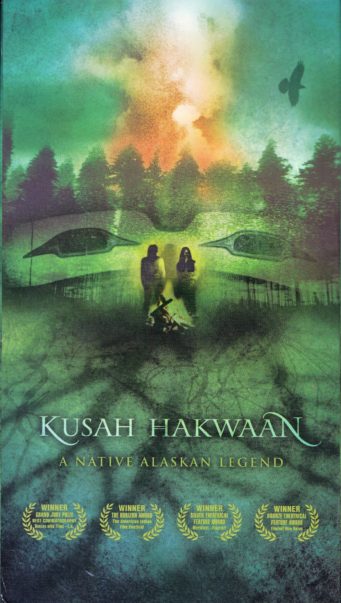 One of those no-budget wonders that demands the viewer be VERY forgiving, yet offers a number of real rewards for those willing to put up with its shoddy production values. In fact, in some respects this 1999 film’s dimestore veneer actually works to its advantage, giving the proceedings the go-for-broke feel of fantasy cinema from countries like Hong Kong and Indonesia, whose makers tend to pay scant attention to the fact that their ambitions far outweigh their resources.
One of those no-budget wonders that demands the viewer be VERY forgiving, yet offers a number of real rewards for those willing to put up with its shoddy production values. In fact, in some respects this 1999 film’s dimestore veneer actually works to its advantage, giving the proceedings the go-for-broke feel of fantasy cinema from countries like Hong Kong and Indonesia, whose makers tend to pay scant attention to the fact that their ambitions far outweigh their resources.
Another notable aspect of KUSAH HAKWAAN is that it was apparently the first-ever Alaskan film to be made entirely by Alaskans, and also the first to feature dialogue in the Tlingit Indian language. Those aspects may explain why the film was so widely overpraised during its early-00s festival run, where it won a number of awards—but then again, it also didn’t deserve the bad reviews it got in publications like Variety, who complained about the film’s “sense of botched spookiness” and deduced that it “will charm only die-hard fans of American Indian storytelling.”
The setting is a Tlingit gathering in which a tribal elder known as Uncle (Kuth Ka) relates the story of Kusah Hakwaan, or “Demon Cannibal.” In the story, the dramatization of which takes up much of the reminder of the film, brothers Shawan (Don Savage) and Yuntun (Paul Asicksik) set off on an epic mountain hunt. Unfortunately, the evil Kusah Hakwaan (Diane E. Benson) is active in the area, as is claimed by the supernaturally-endowed trickster Raven (Gary Waid).
Shawan and Yuntun are assailed by nightmares in which red smoke is quite prevalent, symbolizing the house of Kusah Hakwaan. Raven aids the brothers by flying across the world and finding two magical amulets: a stone dredged from a lava flow and a horn filled with water filched from the “top of the world.”
On the following night the brothers happen upon a hut from which a woman’s voice emanates. This, we learn, was the house of Kusah Hakwaan, who lived with her sister until Kusah developed an insatiable craving for human flesh and left, turning her sibling into a tree. Shawan and Yuntun confront the tree-woman inside the hut, and she gives them some pertinent advice about facing down her sister, telling them to break their spear upon meeting the demon cannibal.
The brothers venture a bit further into the forest, running into several more tree people, before finally happening upon Kusah herself. The resulting fight sees the brothers using the lava rock, which causes a mountain to spring up (to hide them from Kusah), and then the water horn (which causes Kusah to be briefly washed away in a flood), after which they break their spear (which releases the murdered souls trapped within it in the form of trees that entrap Kusah), but none of it stops the cannibal bitch. Clearly the brothers will need the help of Raven to defeat Kusah, which Raven generously provides in the form of a bonfire and some juicy fish…
Once again: in viewing this film one must be forgiving! I can’t make any excuses for the muddy photography (offset somewhat by the pretty Alaskan scenery), substandard sound recording and amateurish performances, and also the fact that most of Uncle’s dialogue is in Tlingit while just about everyone else speaks in modern English—and mouths stilted, overly expository dialogue like “You think food is just going to come to us? That’s why we’re travelling in the mountains, higher than ever.”
Yet the film has an undeniable charm, even if that charm is of the campy variety. Producer-director Sean Morris lacked the resources to properly depict the elaborate special effects called for by the script—which include people turned into trees, mountains rising out of the ground and mass foliage sprouting up—but the absence of visual trickery doesn’t detract. It’s the audacity of Morris’s approach and the cleverness with which he goes about relating his narrative (the device of having the tribe’s children frequently question Uncle about his tale, the details of which don’t always make sense to them, is especially edifying) that make KUSAH HAKWAAN a quality product.
Vital Statistics
KUSAH HAKWAAN
Alaskan Nomad Productions
Director/Producer: Sean Morris
Screenplay: Sean Morris, Bryan Davidson
Cinematography: Eric S. Forster
Editing: Scott Summers
Cast: Kuth Ka, Robert Gales, James Williams, Kert LaBelle, Paul Asicksik, Don Savage, Gary Waid, Diane E. Benson
